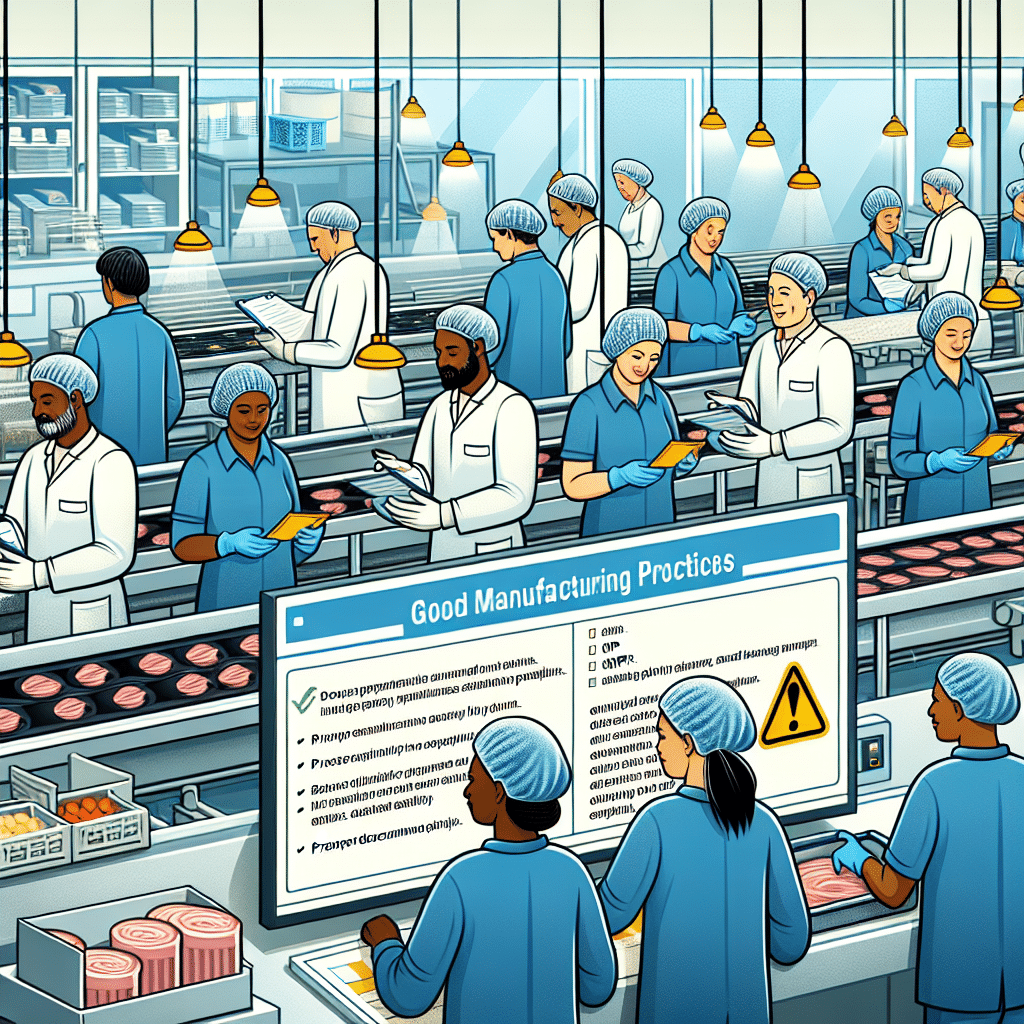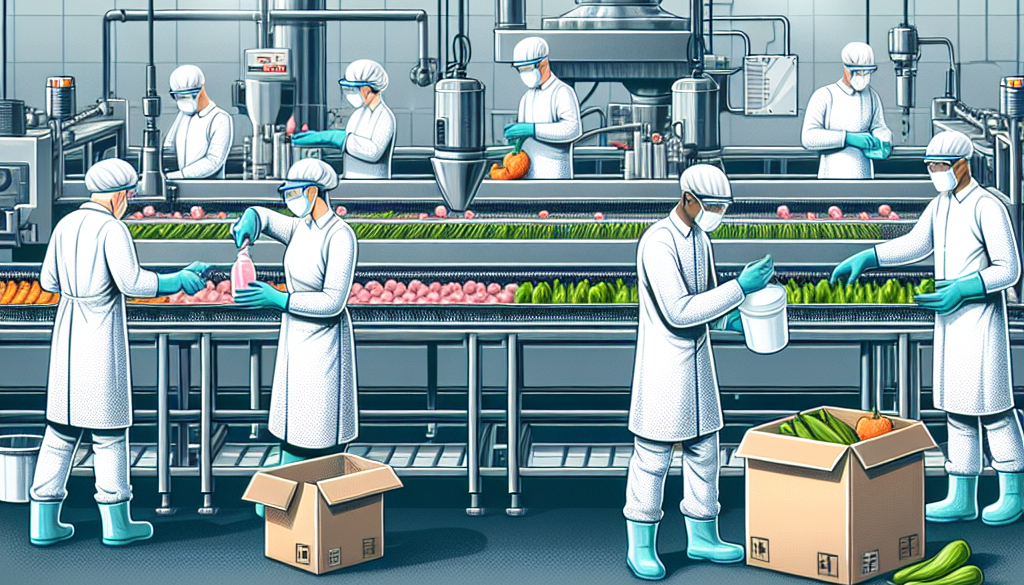Following GMP is Necessary for Food Safety
-
Table of Contents
- GMP Compliance: Ensuring Food Safety and Consumer Trust
- Understanding Good Manufacturing Practices (GMP)
- The Importance of GMP in Food Safety
- Key Components of GMP in Food Manufacturing
- Statistics Highlighting the Impact of GMP on Food Safety
- Challenges in Implementing GMP
- Conclusion: The Critical Role of GMP in Food Safety
- ETprotein: Your Partner for High-Quality Protein Products
GMP Compliance: Ensuring Food Safety and Consumer Trust

The safety of the food supply is a paramount concern for consumers, manufacturers, and regulatory agencies worldwide. Good Manufacturing Practices (GMP) are a set of guidelines that provide a system of processes, procedures, and documentation to assure that the food product has the identity, strength, composition, quality, and purity that it is represented to possess. In this article, we will explore why following GMP is not just a regulatory requirement but a critical component of food safety and consumer trust.
Understanding Good Manufacturing Practices (GMP)
Good Manufacturing Practices (GMP) are the practices required in order to conform to the guidelines recommended by agencies that control the authorization and licensing of the manufacture and sale of food and beverages, cosmetics, pharmaceutical products, dietary supplements, and medical devices. These guidelines provide minimum requirements that a manufacturer must meet to ensure their products are consistently high in quality, from batch to batch, for their intended use. The main goal of GMP is to prevent harm from occurring to the end user.
The Importance of GMP in Food Safety
Adherence to GMP regulations is essential for ensuring food safety for several reasons:
- Contamination Prevention: GMP helps in preventing contamination of food products with pathogens, chemicals, and physical contaminants that could lead to foodborne illnesses.
- Consistency: GMP ensures that food products are produced consistently in terms of quality, taste, and texture.
- Traceability: GMP provides a traceability system that helps in tracking the product throughout the supply chain, which is crucial in the event of a product recall.
- Consumer Confidence: By following GMP, manufacturers can assure consumers that the food products they purchase are safe and of high quality.
Key Components of GMP in Food Manufacturing
There are several key components of GMP that are particularly relevant to food manufacturing:
- Hygiene: GMP requires that all manufacturing facilities maintain a high level of cleanliness and hygiene.
- Controlled Environmental Conditions: To prevent cross-contamination, GMP ensures that environmental conditions are controlled.
- Equipment Verification: All equipment must be properly maintained and calibrated to ensure they are functioning correctly.
- Validated Processes: Manufacturing processes must be validated to ensure consistency and compliance with specifications.
- Employee Training: Employees must be trained to understand and implement GMP to maintain product quality and safety.
- Record Keeping: Detailed records must be kept as evidence of GMP compliance and to trace the history of each batch of product.
Statistics Highlighting the Impact of GMP on Food Safety
Statistics from various studies and reports highlight the impact of GMP on enhancing food safety:
- A report by the Centers for Disease Control and Prevention (CDC) estimates that each year roughly 1 in 6 Americans (or 48 million people) get sick, 128,000 are hospitalized, and 3,000 die of foodborne diseases.
- Implementation of GMP can significantly reduce the occurrence of foodborne illnesses. For instance, a study published in the Journal of Food Protection found that companies with GMP certification had significantly fewer recalls and safety incidents.
- According to the Food and Drug Administration (FDA), compliance with GMP regulations has been shown to decrease the risk of product contamination and recalls, thereby saving the food industry millions of dollars annually.
Challenges in Implementing GMP
Despite the clear benefits, there are challenges associated with implementing GMP:
- Cost: The initial investment in GMP compliance can be high for small and medium-sized enterprises (SMEs).
- Complexity: The complexity of GMP regulations can be daunting, especially for businesses new to the market.
- Continuous Improvement: GMP is not a one-time effort; it requires continuous monitoring and improvement, which can be resource-intensive.
Conclusion: The Critical Role of GMP in Food Safety
In conclusion, following Good Manufacturing Practices is not just a legal obligation but a fundamental necessity for ensuring food safety and maintaining consumer trust. By adhering to GMP, food manufacturers can prevent contamination, ensure product consistency, and provide traceability. While there are challenges in implementing GMP, the benefits far outweigh the costs, as evidenced by the reduction in foodborne illnesses and recalls. As consumers continue to demand higher standards for the foods they consume, GMP compliance will remain an essential aspect of the food manufacturing industry.
ETprotein: Your Partner for High-Quality Protein Products
If you are in the market for high-quality protein products that adhere to strict GMP standards, ETprotein is your go-to source. ETprotein offers a wide range of organic bulk vegan proteins and L-(+)-Ergothioneine (EGT) that meet the highest quality standards. Their products, including Organic rice protein, clear rice protein, pea protein, and many more, are characterized by a neutral taste, non-GMO, allergen-free attributes, with L-(+)-Ergothioneine purity over 98%, 99%. Whether you are a distributor, trader, or manufacturer in the food and beverage industry, ETprotein can meet all your protein needs with their extensive product range.
About ETprotein:
ETprotein, a reputable protein and L-(+)-Ergothioneine (EGT) Chinese factory manufacturer and supplier, is renowned for producing, stocking, exporting, and delivering the highest quality organic bulk vegan proteins and L-(+)-Ergothioneine. They include Organic rice protein, clear rice protein, pea protein, clear pea protein, watermelon seed protein, pumpkin seed protein, sunflower seed protein, mung bean protein, peanut protein, and L-(+)-Ergothioneine EGT Pharmaceutical grade, L-(+)-Ergothioneine EGT food grade, L-(+)-Ergothioneine EGT cosmetic grade, L-(+)-Ergothioneine EGT reference grade and L-(+)-Ergothioneine EGT standard. Their offerings, characterized by a neutral taste, non-GMO, allergen-free attributes, with L-(+)-Ergothioneine purity over 98%, 99%, cater to a diverse range of industries. They serve nutraceutical, pharmaceutical, cosmeceutical, veterinary, as well as food and beverage finished product distributors, traders, and manufacturers across Europe, USA, Canada, Australia, Thailand, Japan, Korea, Brazil, and Chile, among others.
ETprotein specialization includes exporting and delivering tailor-made protein powder and finished nutritional supplements. Their extensive product range covers sectors like Food and Beverage, Sports Nutrition, Weight Management, Dietary Supplements, Health and Wellness Products, and Infant Formula, ensuring comprehensive solutions to meet all your protein needs.
As a trusted company by leading global food and beverage brands and Fortune 500 companies, ETprotein reinforces China’s reputation in the global arena. For more information or to sample their products, please contact them and email sales(at)ETprotein.com today.












